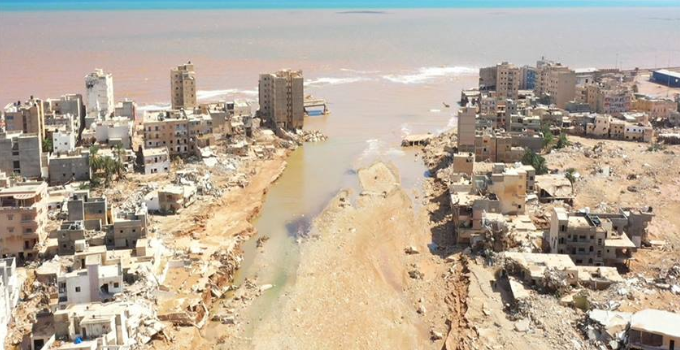
Catastrophic flooding in Derna leaves thousands dead, missing, and the city forever changed as survivors recount their terrifying experiences.
The first sign of danger came with the dogs’ frantic barking. It was 2:30 a.m. in Derna, eastern Libya, and Husam Abdelgawi, a 31-year-old accountant, was roused from his sleep. Heading downstairs to investigate, he felt cold water beneath his feet. When he opened the front door of the house he shared with his younger brother, Ibrahim, a wave of water surged inside, tearing the door off its hinges.
The two brothers scrambled to the back door, only to be confronted by a scene Husam described as “unimaginable and worse than death.” In the dim light, they saw bodies of women and children floating past, cars swept away, entire homes reduced to debris. Some bodies were even pulled into their house by the powerful current. The surge carried Husam and Ibrahim with terrifying speed, separating them by nearly 150 metres in seconds. Ibrahim, just 28, managed to catch hold of floating power cables and pulled himself back toward Husam. Using the cables, they climbed to a nearby building’s third-floor window, finally reaching safety on a rooftop.
“The area we found was higher up,” Husam recounted from Al-Qubbah. “In the lower parts, I doubt anyone on higher floors survived; I think they are all gone.”
Estimates of the death toll vary widely. Libya’s UN ambassador reported around 6,000 confirmed deaths, while the Libyan Red Crescent suggested 10,000 may have perished. Derna’s mayor warned that fatalities could reach 20,000. The tragedy began when two dams outside Derna collapsed, unleashing torrents of water through the heart of the city, splitting it in two.
Rahma Ben Khayal, an 18-year-old student, had also reached safety on a rooftop. “Everything in between the city’s two halves is gone,” she said. “Those people didn’t survive.”
The deluge had started as light rain the day before. It seemed harmless at first, according to Amna Al Ameen Absais, a 23-year-old medical student who, after losing both parents to illness, had taken on guardianship of her three younger siblings. As rain fell, the siblings passed time in their first-floor apartment, playing games. Amna even dressed her youngest brother in a life vest, just in case, joking with him.
But as the hours passed, the rain grew intense, sirens sounded, and the family couldn’t sleep. “Around 2:30 a.m., the noise became terrifying,” Amna said from Tobruk. Her brother glanced outside, seeing water flooding the street. Moving to higher floors, they climbed to a friend’s third-floor flat, but the water quickly reached them there, forcing the siblings to move up again.
Panic had gripped everyone as they climbed to the seventh floor, where Amna lost track of her cat and briefly of her younger brother. From the rooftop, she saw friends waving torches from a nearby building’s roof—moments later, the building crumbled into the flood.
The catastrophe struck Amna’s family as well; her uncle’s building collapsed, and he, his wife, and their sons remain missing. After floodwaters receded, Amna and her siblings finally descended, only to find their entire street swallowed by an enormous cavity. “It was as though the earth had opened,” she said.
Many survivors, including Husam, now face unimaginable loss. “I counted at least 30 friends among the dead,” he said. “It’s a miracle I’m here.” Derna itself is ravaged, entire neighbourhoods obliterated.
Authorities are calling for accountability. Mohamed al-Menfi of Libya’s internationally recognised government has requested an investigation, saying those responsible for the dams’ collapse should be held accountable. The World Meteorological Organization argued the scale of loss might have been prevented with a functioning weather service, as early warnings could have led to evacuations.
Survivors now wait anxiously for news of loved ones, while others mourn those already lost and the city they once knew. “I don’t think I can go back,” said Amna. “Those streets were my life. Now, they’re gone.”










